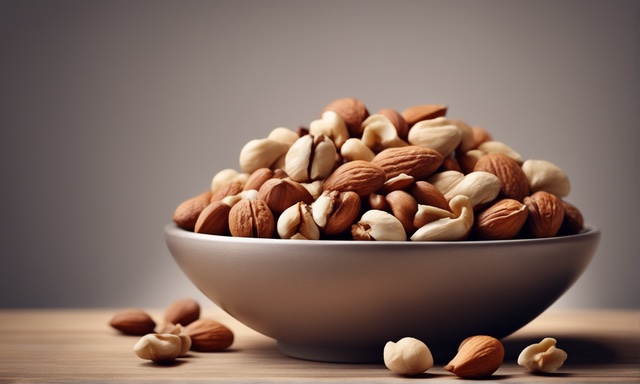Internet Asks: "Are Nuts Vegan?"
The growing trend of veganism has prompted a surge of interest in plant-based foods, with individuals scouring for nourishing, ethical, and sustainable options to incorporate into their diets while abstaining from consuming any animal-derived products. A question often posed by both new and seasoned vegans is: “Are nuts vegan?”. Let’s delve into the world of nuts and crack open the truth.
sponsored links

Understanding Veganism
A vegan diet essentially excludes all forms of animal products and by-products. This includes meat, dairy, eggs, and even ingredients derived from animals, such as gelatin and honey. Veganism is more than a dietary choice; it's a lifestyle dedicated to avoiding the exploitation and cruelty towards animals. This means abstaining from animal products, not only in food but also in clothing, cosmetics, and other products. When examining any food's vegan status, the lens must widen beyond ingredients to include considerations about the entire production process.
Nuts: A Vegan Staple?
Undoubtedly Yes! From a botanical standpoint, nuts are indeed plant-based. Harvested from the hard-shelled fruit of various plants and trees, nuts are purely plant-based, naturally falling into the category of vegan-friendly foods. Examples include almonds, walnuts, and hazelnuts. They aren't produced through any form of animal exploitation and don't contain animal products, making them a perfect fit for vegan diets.
Why Nuts are a Vegan Favorite:
- - Rich Nutritional Profile: Packed with essential nutrients like protein, healthy fats, fibers, vitamins, and minerals, nuts are nutritional powerhouses that offer myriad health benefits.
- - Sustainability: Most nuts are sustainably sourced and have a low environmental footprint compared to animal-based foods, aligning with the ethical considerations of many vegans.
- - Versatility: Their ability to be incorporated into various dishes, from salads and desserts to being consumed raw, makes nuts a favorite among vegans.
Ethical Considerations
While nuts themselves are unquestionably plant-based, there might be ethical considerations that some vegans wish to think about. The production and harvesting processes of some nuts can be resource-intensive.
For instance, almond cultivation is often criticized for its significant water usage, and in some regions, it might contribute to unsustainable water consumption practices. Similarly, cashew processing is labor-intensive, and in certain countries, it has been associated with unfair labor practices.
sponsored links
Choosing Ethically
For vegans who adhere to the diet for ethical reasons, understanding the supply chain and production practices of the nuts they consume is crucial. Opting for fair trade and sustainably sourced products can be a conscientious choice that aligns with the broader ethical considerations of veganism. There are steps that can be taken:
-
- Research and Support: Choose brands that are transparent about their sourcing and labor practices. Many companies now provide information regarding their commitment to sustainability and fair trade.
-
- Buy Local and Seasonal: Whenever possible, opt for nuts that are locally grown and harvested in season. This not only supports local economies but also minimizes your food’s carbon footprint.
-
- Look for Certifications: Labels such as Fair Trade, Rainforest Alliance, or USDA Organic can provide assurance about the ethical and environmental standards upheld by the brand.
In Conclusion
Nuts are not only vegan but also a valuable addition to a vegan diet, providing essential nutrients and a crunch to your meals. However, the conscious consumer may wish to dig deeper, investigating the ethical practices behind their production and making choices that align with a commitment to sustainability and fairness. With a bit of research and mindful purchasing, nuts can be enjoyed in a way that nourishes the body while respecting the planet and its inhabitants.
Disclaimer: This article is intended for informational and educational purposes only and is not a substitute for professional nutritional or medical advice. Always seek the advice of a qualified healthcare provider with any questions you may have regarding dietary choices and nutrition.
sponsored links
References
1. Colón, Suzan. "veganism". Encyclopedia Britannica, 18 Aug. 2023, https://www.britannica.com/topic/veganism. Accessed 2 October 2023.
2. WebMD. What Is a Vegan Diet?. https://www.webmd.com/diet/vegan-diet-overview
3. attn:. 5 Surprising Foods That Make It Hard to Be an Ethical Vegetarian. https://archive.attn.com/stories/2284/5-foods-make-it-hard-be-ethical-vegetarian
4. The Vegan Review. Cashews: Inside the industry’s unethical practices and labour conditions. https://theveganreview.com/cashews-inside-the-industry-un-ethical-practices-and-labour-conditions/
5. The Minimalist Vegan. Looking Beyond The Nutrition Label: Being an Ethical Vegan. https://theminimalistvegan.com/ethical-vegan/
People are also reading...
Calories In Steak?
Chicken Taco Calories?
Does Hot Chocolate Have Caffeine?
Are Carrots Acidic?
Are Mangoes Acidic?
Orange Juice pH?
Calories In a Grilled Cheese?
Is Watermelon Acidic?
6 oz Steak Calories?
Ready to level-up?
Create meal plans 10x faster, follow up with your clients through our mobile app, and never struggle with meal planning or recipe management again.